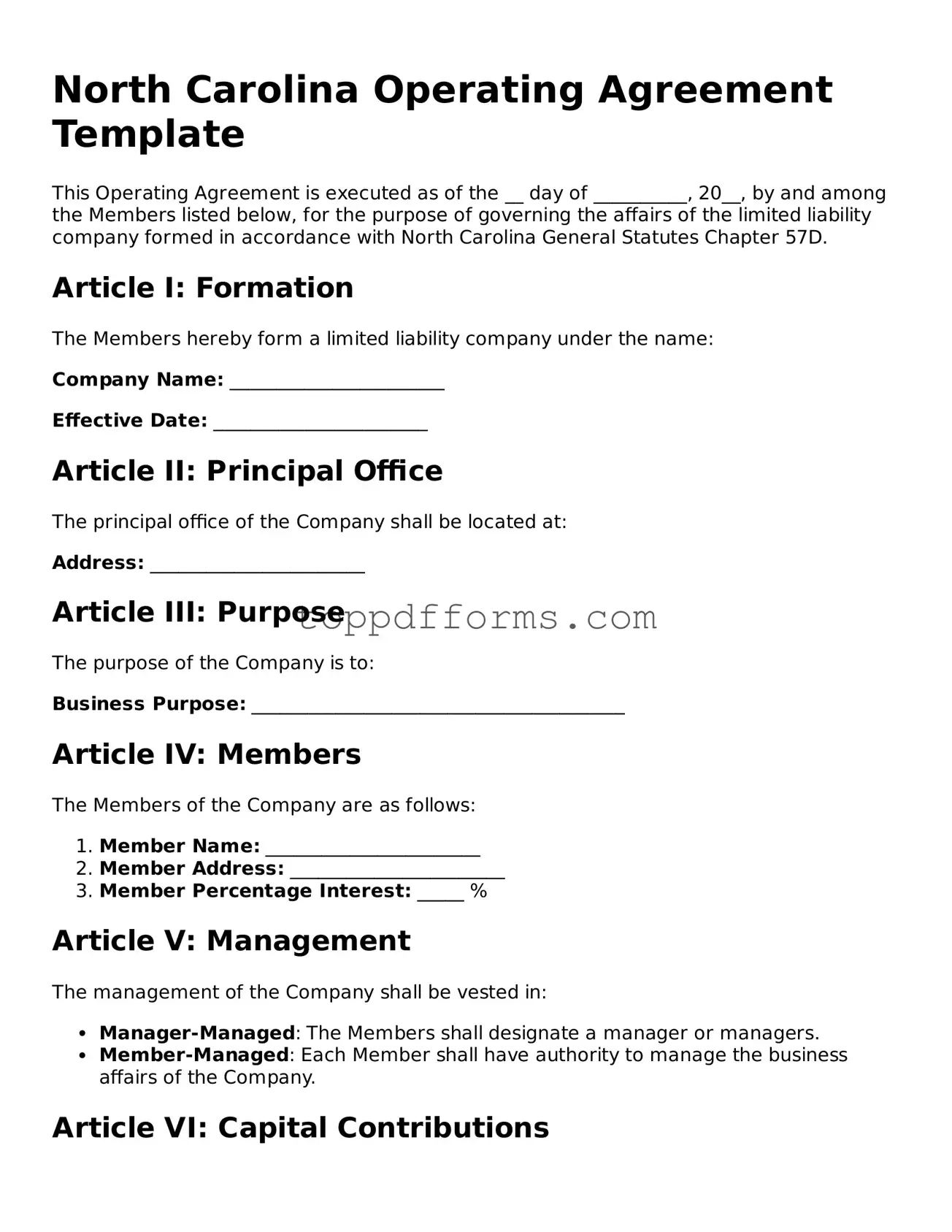Operating Agreement Document for North Carolina State
Things You Should Know About This Form
What is a North Carolina Operating Agreement?
A North Carolina Operating Agreement is a legal document that outlines the management structure and operating procedures of a limited liability company (LLC). This agreement serves as a guide for how the LLC will operate, detailing the roles and responsibilities of members, decision-making processes, and distribution of profits and losses. While it is not required by law, having an Operating Agreement is highly recommended as it helps prevent misunderstandings among members and provides clarity on the company's operations.
Who should create an Operating Agreement?
All members of an LLC in North Carolina should create an Operating Agreement. This includes single-member LLCs as well as multi-member LLCs. Even if there is only one owner, having an Operating Agreement can help establish a formal structure and protect personal assets. For multi-member LLCs, it is especially important as it defines each member's rights, duties, and share of profits, reducing the potential for disputes in the future.
What should be included in an Operating Agreement?
Several key elements should be included in an Operating Agreement. These typically cover the LLC's name, purpose, and duration. Additionally, the agreement should outline the management structure, detailing whether the LLC will be member-managed or manager-managed. It is important to specify how profits and losses will be distributed, as well as the process for adding or removing members. Including provisions for resolving disputes and handling changes in ownership is also advisable to ensure smooth operations.
Is an Operating Agreement required in North Carolina?
No, an Operating Agreement is not legally required in North Carolina. However, having one is beneficial. Without it, the LLC will be governed by the default rules set by state law, which may not reflect the members' intentions. An Operating Agreement provides a customized framework for the business, helping to protect the interests of the members and ensuring that everyone is on the same page regarding the LLC's operations.
PDF Overview
| Fact Name | Description |
|---|---|
| Purpose | The North Carolina Operating Agreement outlines the management structure and operating procedures of a limited liability company (LLC). |
| Governing Law | This agreement is governed by the North Carolina Limited Liability Company Act. |
| Members | All members of the LLC should be included in the agreement, detailing their rights and responsibilities. |
| Management Structure | The agreement specifies whether the LLC will be member-managed or manager-managed. |
| Capital Contributions | It details the initial capital contributions made by each member and how future contributions will be handled. |
| Profit Distribution | The agreement outlines how profits and losses will be distributed among the members. |
| Amendments | It provides a procedure for making amendments to the agreement in the future. |
| Dispute Resolution | The agreement may include provisions for resolving disputes among members, such as mediation or arbitration. |
Common mistakes
Filling out the North Carolina Operating Agreement form can be a straightforward process, but many individuals make common mistakes that can lead to complications down the line. One significant error is failing to include all necessary member information. Each member's name, address, and ownership percentage must be clearly stated. Omitting any of this information can create confusion and disputes among members later.
Another frequent mistake is neglecting to specify the management structure of the business. The Operating Agreement should clearly outline whether the company will be managed by its members or by appointed managers. Without this clarity, members may have different expectations about their roles and responsibilities, potentially leading to conflicts.
Some individuals also overlook the importance of including provisions for handling disputes. It is crucial to establish a clear process for resolving disagreements among members. Without these provisions, conflicts may escalate and become more difficult to resolve, potentially harming the business and its relationships.
Additionally, many people fail to address the procedures for adding or removing members. This oversight can create significant challenges if a member decides to leave or if new members wish to join. Clear guidelines should be established to ensure that these transitions are smooth and legally compliant.
Lastly, not reviewing the document for compliance with state laws can be a critical mistake. North Carolina has specific requirements for Operating Agreements that must be met. Failing to adhere to these regulations can result in the agreement being deemed invalid, which can have serious implications for the business's operations and legal standing.
Other Common State-specific Operating Agreement Forms
How to Write an Operating Agreement - It serves as a critical resource for guiding the direction of the business amidst changes and challenges.
When engaging in the sale of a recreational vehicle, it's important to have the proper documentation in place to protect both parties involved. The Texas RV Bill of Sale serves as an official record of the transaction, ensuring that all details are accurately captured. To streamline this process, you can access the necessary forms through PDF Templates, which makes it easier for buyers and sellers to complete this important step.
Open a Llc - It helps ensure compliance with state regulations governing LLCs.
